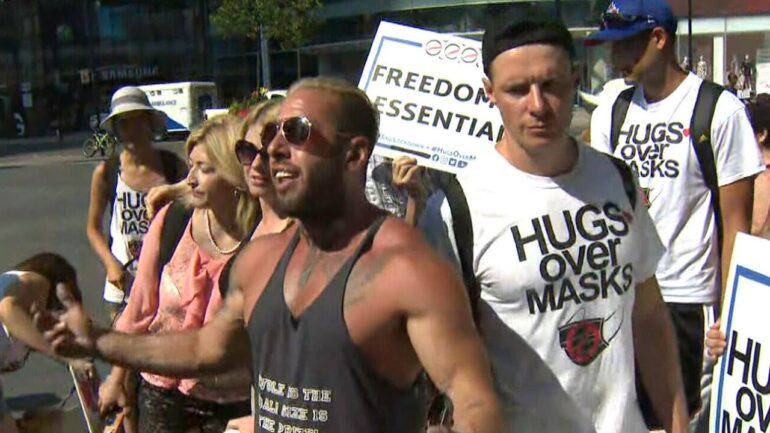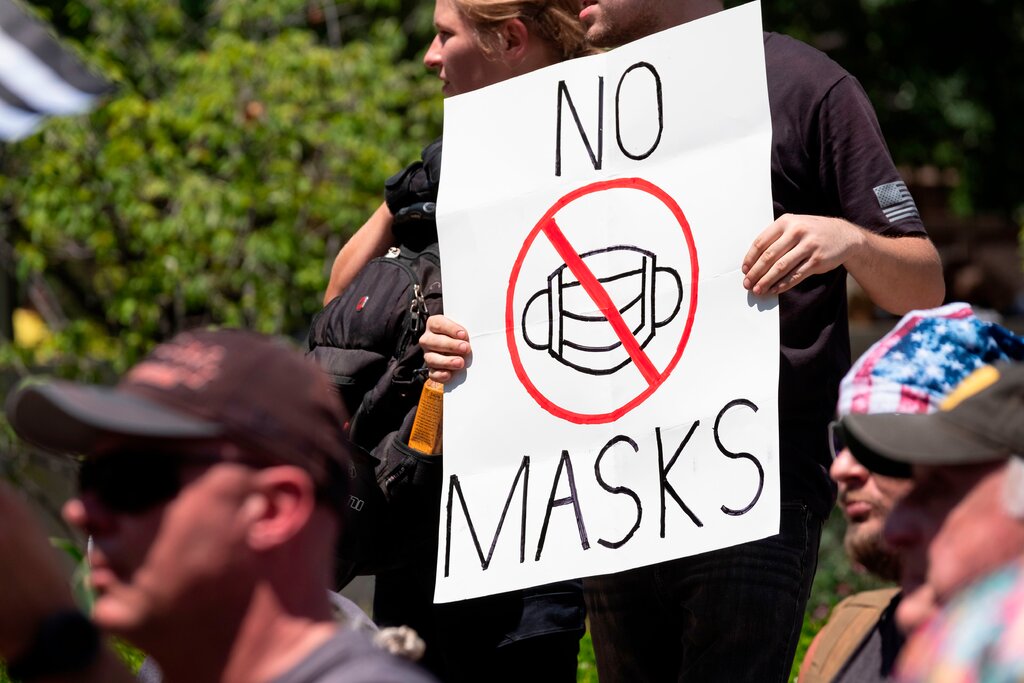Nicholas Rahmon
Anti-mask protestors in the streets of Quebec receive $400 in fines for not following mandatory mask guidelines, while some Toronto protestors go unmasked and unchallenged.
Cases of COVID-19 are starting to rise again in Ontario, with 721 reported on Oct. 14, and in Quebec, with 844 and one death on the same day.
Because of this, many Canadians continue to exercise caution and follow the mandatory mask regulations for all indoor environments and outdoor gatherings. But there are those who either deny the existence of the virus or believe the response is restrictive, if not an indoctrination to government plans to violate their human rights.
Known as anti-maskers, the conspiracy theorists have dedicated themselves to the cause, with some looking to make a name for themselves.
People like Chris Saccoccia — who was charged for leading an anti-mask protest in Toronto and was arrested in Moncton, N.B., before a planned protest — has been working diligently to make his message clear to those listening.

He’s pitched a free, province-wide anti-mask private school system where children could be taught by non-accredited teachers.
Saccoccia and his wife Jennifer, present at the protests, are to appear at a virtual court hearing on Nov. 11 for the Toronto charges, according to a Toronto Police news release.
“The Toronto Police Service has laid charges against two individuals [Chris Saccoccia and Jennifer Saccoccia] under the federal Quarantine Act, on behalf of federal Quarantine officers,” Constable David Hopkinson said in the release
Saccoccia and his wife re-entered Canada via Pearson International Airport Sept. 20 and were told to quarantine for 14 days.
Six days after he arrived back in Toronto he went to Yonge Street and Dundas Square. As a result, he was fined $1,000 for violating the Quarantine Act.
Saccoccia and his wife then returned one week later on Oct. 3 to a 500-person unmasked protest in the same location and were both served an appearance notice.
Over the course of the pandemic, a large group of unmasked protestors filled TTC buses, walked the downtown streets, or entered stores without the use of a facial covering.
Embed from Getty ImagesAnti-mask protesters got the attention of Toronto Police officers who first looked to educate protestors on the law, Hopkinson said in an interview with Humber News.
“The rules are based on common sense. If you’re able to be socially distant, a mask isn’t required. If you aren’t, you’re required to wear one,” he said.
“It’s only been recently that the Toronto police have been switching from educating the public on COVID-19 to an enforcement platform,” Hopkinson said.
Edward Gordon, a paramedic for Toronto Paramedic Services and a frontline essential worker, said the work the police do to educate anti-maskers about the dangers of not wearing a facial covering is for the best of the community.
He said as the second wave of COVID-19 develops and as the numbers of new daily cases now hover in the mid-700s, masks continue to be essential and help prevent more cases.
“People who aren’t wearing them should be fined,” Gordon said. “There’s only been a handful of people and it’s completely backwards [that] you can’t go to churches, schools, or certain workplaces but you see thousands of people marching, it’s completely absurd.”
Dr. Salvatore Spadafora, professor of anesthesiology and pain medicine at the University of Toronto, sees the pandemic as a learning opportunity and states people should continue to be aware of socially distancing when possible and wearing a mask.
“This wave finds us with much new knowledge and a greater understanding of the virus and the illness it may bring. Our response is and should be one that is much more based on knowledge and respect,” Spadafora said.
He said the efforts from the authorities to educate the community on the matter of their health should continue to be utilized.
Spadafora said he believes there are many legal tools including fines available to authorities which will be judiciously applied, and “ultimately all of us should endeavour to do what protects the greater common good and the health of our community.”

